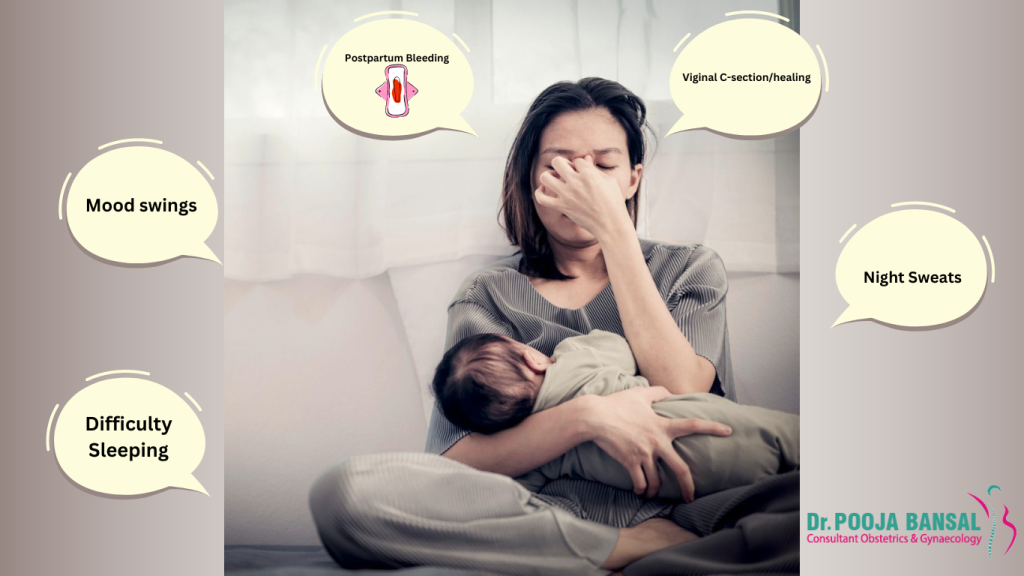When a woman gives birth to a baby she desires, it is usually a joyful event. Despite the pain and discomfort, birth marks the end of a long pregnancy and the beginning of a new life. However, birth is also a critical time for the mother’s and her newborn health. The priority should be to address the issues, if not can lead to illness for one or both. Nonetheless, maternity care frequently overlooks the postpartum period. The lack of postpartum care ignores the fact that the majority of maternal illness occur during childbirth.
What is postpartum?
The “postpartum” period begins after the newborn is born. Because the effects of pregnancy take time for women’s bodies to return to the pre-pregnancy state, it is commonly thought to last six to eight weeks after birth. (This includes hormone levels and uterus size, among other things, returning to a non-pregnant state.)
Postpartum is also known as “Baby Blues”.
What are Baby Blues Symptoms?
Baby blues typically begin within the first two to three days of birth and can last for up to two weeks. Most women experience “baby blues,” which include
- Mood Swings.
- Feeling Dull.
- Alone.
- Crying.
- Anxiety.
- Difficulty Sleeping.
Postpartum care is unique in that it concerns at least two people with very different needs – the mother and her baby.
Postpartum care should address the special needs of the mother and baby during this time, and should include the following:
- The prevention, early detection, and treatment of complications and disease.
- The provision of advice and services on
- Breastfeeding.
- Birth spacing.
- Immunization.
- Maternal nutrition.
#Symptoms of Postpartum:
- The primary symptom is fever.
(Antibiotics are the primary treatment, but prevention by ensuring cleanliness and hygiene at delivery is the best course of action.)
- Puerperal infections like sepsis.
- Eclampsia.
- Urinary tract issues, such as infections, urinary retention, or incontinence.
(Many women also experience pain in the perineum and vulva for several weeks after giving birth, especially if tissue damage or an episiotomy was performed during the second stage of labour.)
- Psychological issues.
- Iodine deficiency disorders, vitamin A deficiency, and anaemia due to iron deficiency.
(Preventive and treatment measures include ensuring adequate food intake, food fortification, and providing supplements to pregnant and lactating women, as well as infants and children.)
#In the postpartum period women need:
Advice On:
-
- Care of the baby and breastfeeding.
-
- What happens with and in their bodies –(including signs of possible problems)
- Self-Care.
- Hygiene and healing.
- Sexual life.
- Contraception.
- Nutrition.
- Needs to Provide:
-
- Health Care Providers.
- Partner and Family.
- Emotional and Psychological.
- Health Care for Suspected or Manifest Complications.
- Time to Care for the Baby.
- Help With Domestic Tasks.
- Maternity Leave.
- Common Thoughts:
- Inadequacy.
- Loss of marital intimacy.
- Isolation.
- Constant responsibility for care for the baby and others.
#Needs / Care of New-born during Postpartum:
- Easy Access to the Mother.
- Appropriate Feeding.
- Adequate Environmental Temperature.
- A Safe Environment.
- Parental Care.
- Cleanliness.
- Observation of Body Signs (Take Action If Necessary).
- Access to Health Care for Suspected or Manifest Complications.
- Nurturing, Cuddling, Stimulation.
- Protection from – Diseases – Harmful Practices – Abuse/Violence.
One of the primary goals of postpartum care should be the Systematic timetable of breastfeeding.
- Breast milk provides newborn infants with optimal nutrition, protects them from infections and allergies, and promotes mother-infant bonding.
- The baby should be given to the mother to hold immediately after birth to allow for skin-to-skin contact and for the baby to begin suckling as soon as he or she shows signs of readiness, which is usually within an hour of birth.
- Babies should be kept with their mothers, and unrestricted breastfeeding should be permitted. Mothers require assistance and advice on how to breastfeed. Feed supplements should be avoided.
Dr Pooja Bansal Consultant Gynecologist and Obstetrician in Navi Mumbai. Currently practising at her Women’s Clinic in Navi Mumbai, Bansal Speciality Clinic. Shares her mind on Care for Mother and Baby after Pregnancy (Postpartum). Spreading awareness and consulting pregnant women and their families on pregnancy health and helping them through their pregnancy journey.

